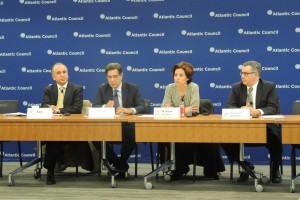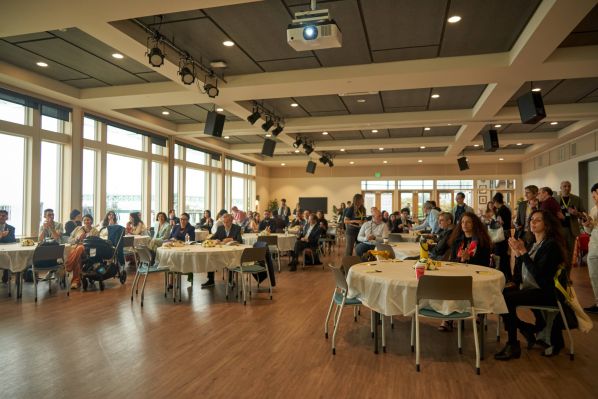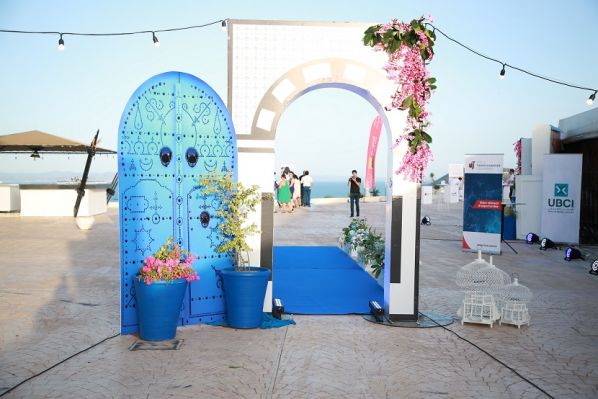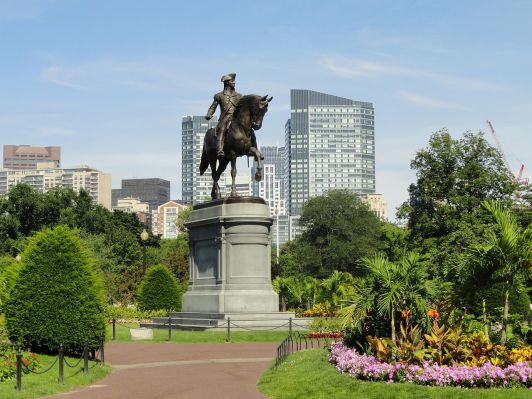Reasonably optimistic about the economic prospects in Tunisia

Under the theme of “ Tunisia’s next chapter: The Nexus between Politics, Economy and Security” the Atlantic Council hosted a roundtable discussion on March 4, 2014 exploring Tunisia’s political and economic challenges after the ratification of the new constitution and the installation of a new government. The panel featured Kais Darragi, the deputy chief of mission of the Tunisian Embassy in Washington, Haykel Ben Mahfoudh, professor at the University of Carthage and senior advisor on security sector reform, Mariem Malouche founding member of Tunisian American Young Professionals and World Bank senior economist, and Radwan Masmoudi, president of the Center of the study of Islam and Democracy
Legacy of previous transition governments and current situation As of today, we are reasonably optimistic that the economic situation will improve in Tunisia, and that we are engaged in a positive slope. I would not have said that a few weeks ago. The unemployment numbers are still high at above 15%, much higher in rural areas and among youth and women. The growth rate in 2013 was lower than 3% while Tunisia needs a number well above 3%to start making a dent in the stock of unemployed. Many Tunisians are rightly concerned about the visible deterioration of the economy since January 2011 and ever since the Prime Minister made a public declaration about the current economic situation.
Some of the reasons of the current deterioration of the economy are purely external, others are self inflicted. The external reasons are mainly the economic slowdown in Europe, Tunisia’s main partner and export market, source of tourists and remittances from the Tunisian diaspora, but also the crisis in Libya where many Tunisians used to work and do business. The other reasons are self- inflicted. Let me cite three of them:
(i) The previous two transition governments were not experienced enough to manage an economy in turmoil and a society in distress. Very few reforms were initiated or even debated to indicate a rupture with past practices of cronyism and corruption to a more open and competitive economy. At the same time, a number of populist short-term measures were taken to buy time. For example, the government has tried to address the unemployment problem by hiring in the public sector and state owned enterprises that are already poorly managed and inefficient. We are talking about thousands of new hires, and a lot of them were political appointees. This has not only damaged the institutions but also weakened the government’s fiscal position and increased Tunisia’s external financing needs that are not going to the productive sector and/or to investment in the infrastructure.
The PM announced even bigger numbers. He assessed the financial needs for about $8 billion (12 billion TD). So far the government is still short of about $3 billion. Of course, these measures were themselves acceptable to mitigate the impact of the crisis in the short term, but the transition took longer than expected and we couldn’t afford it such unproductive expenditure for so long. We will pay for it.
(ii) The security was managed loosely as shown by the political assassinations, circulation of weapons, and isolated acts of terrorism. Informal trade with Libya and Algeria has exploded. Field survey at Ras Ajdir has provided us with a clear picture about what is happening on a daily basis: Hundreds of trucks cross the border without being controlled and without paying the due taxes, translating into all kinds of traffic and a huge revenue loss for the Tunisian government. The reason behind this is the difference in subsidies and taxes for a number of goods such as cheese, bananas, apples, gas, air conditioners, rugs, shoes, etc.
- 1. 200-300 commercial car
- 2. 500-600 individual cars transporting goods
- 3. 150-200 Libyan trucks of 38 tons
- 4. 1.2 billion TD or 25% of government’s fiscal revenues per the study estimations (12% only customs revenues)
(iii) The level of frustration and mistrust was generally very high in the society, and understandably so after years of dictatorship, repression and lack of freedom of speech and information. As a result, there were unrealistic expectations from the labor union, the unemployed, and all those who felt neglected under the previous regime. We had many strikes at the firm level, with tensions between employees and employers…that further slowed down the economy and contained investment…
What’s next? Despite of the above, Tunisians today are hopeful because we are getting closer to the end of this transition period. We also have a new government of technocrats that is the result of a compromise between political parties and civil society, trade and business union. This government has a triple mandate: restore security, improve the economy and enable elections by end of 2014. It will be challenging, even more than 2 years ago because our institutions are weaker, the population is even more frustrated and impatient, and the reversal of some of the development I just cited are difficult.
We should be expecting soon a clear timeline for the legislative, presidential and local elections. Per the Constitution, it should take place before the end of 2014, and it would be important to commit to this deadline, not only for credibility purposes but also because we have been led by 6 Transition governments since 2011. This is not conducive to structural reforms. In economy, trust and clarity about the government’s program are essential.
IFIs and partners We welcome the prompt support from the international financial institutions that have already expressed their full support to the new government. The IMF has released the second tranche of the Stand By Arrangement with an amount of $500 million. The World Bank has also approved a new budgetary support of $250 million plus other programs to support SMEs, decentralization, transport corridors in the North and the South, etc. this come up to a total of $1.2 billion. France is also supporting projects in infrastructure, and has converted a $60 million loan into investments. President Obama has invited the head of the government for an official visit and this has been seen as a strong supportive message. It is expected that the US would also issue a loan guarantee of $100 million and the Tunisia Enterprise Fund …of a total of $100 million over 5 years should also start soon and fund investments in SMEs.
A Free trade agreement between Tunisia and the US would be highly beneficial to anchor todays’ changes in the future. The US has already a FTAs with friends in the MENA region like Morocco, Egypt, Jordan. It would be very supportive to do the same with Tunisia. There is no threat for the US economy given the size of the Tunisian economy and the distance, while it could yield great benefits in terms of investment and access to markets in the region. Tunisia has a number of FTAs with the EU and neighboring countries, but an FTA with the US would translate into a strong signal in terms of commitment for greater transparency, rule of law and competition.
Private sector led economy However, the IFIs and other partners are only enablers and supportive. The onus is on Tunisians to engage in a major shift in terms of the development agenda and sources of growth. It is time for Tunisia to tackle long-term reforms to transform the Tunisian economy and invest its resources productively. The Prime Minister has not yet presented his program, and only mentioned the freezing of recruitment in the public sector and the need to restructure State enterprises. The cost of maintaining one job in these companies is equivalent to creating 10 jobs elsewhere. So on average, it will be positive in terms of job creation.
However, piecemeal reforms won’t make it if we don’t agree on a new development agenda for Tunisia. It is time for the private sector to grow and become the main engine of growth. The Tunisian economy and in particular the private sector, has suffered too long from cronyism, rent seekers, heavy regulation, discretionary decisions. All of these led to lack of dynamism, competition and innovation in the private sector. Many studies have documented what needs to be done to make the Tunisian economy more competitive from streamlining procedures, increasing transparency, improving the telecom infrastructure, strengthening the financial sector, etc. What Tunisia really needs is a Vision of where we see ourselves in 20-30 years.
For example, we are waiting for the new Investment Code that should set the stage for the incentive system and entrepreneurship culture. In the previous one, it was mostly about giving incentives to the export sector, which created distortions with the local economy, and provided a list of activities where investment was possible, often requiring licenses, with limitations for FDI in services, retail, etc. In Tunisia, the government had to regulate first before any investment could take place. In modern, dynamic, and innovation-based economies, you let entrepreneurs take initiatives and then regulate. The new investment code should adopt a negative list, meaning you can investment everywhere with a few exceptions related to national security reasons for example. Similarly, the incentives should target value addition, R&D, training, etc.
This debate is barely picking up in Tunisia, led by a few scholars and experts. Here all players should be responsible to deliver their economic vision from the government, to political parties that still have not fully exposed their economic agenda to the local experts.
New social pact Another critical dimension is to better define the social contract and the relationship between the government and the population. The government should be seen as a service provider for the citizens. Trust needs to be re-established when dealing with the Administration be it for business procedures, paperwork, Customs clearance, with the police, with the judiciary system…the government should establish social programs such as unemployment benefit, target financial assistance to the most vulnerable and the poorest. This is critical because it will lower tensions and make reforms more acceptable.
In conclusion, Tunisians are hopeful today because, Tunisia has the ingredients to succeed and grow as a democracy, has a competitive economy and a modern and cohesive society. We believe in us and we want our partners to believe in us. We are working very hard to build our future. The engagement of the civil society has been phenomenal and decisive in many critical situations. We also know that other societies are looking up to us. I personally can testify as I travel a lot for my job, and I am always thrilled when I meet Senegalese, or Kazakh, or Moroccan, Malagasy…and they all look at me with envy and pride when I say I am Tunisian. And all Tunisians know it and feel it.
related news




About the author
Mariem M. Malouche